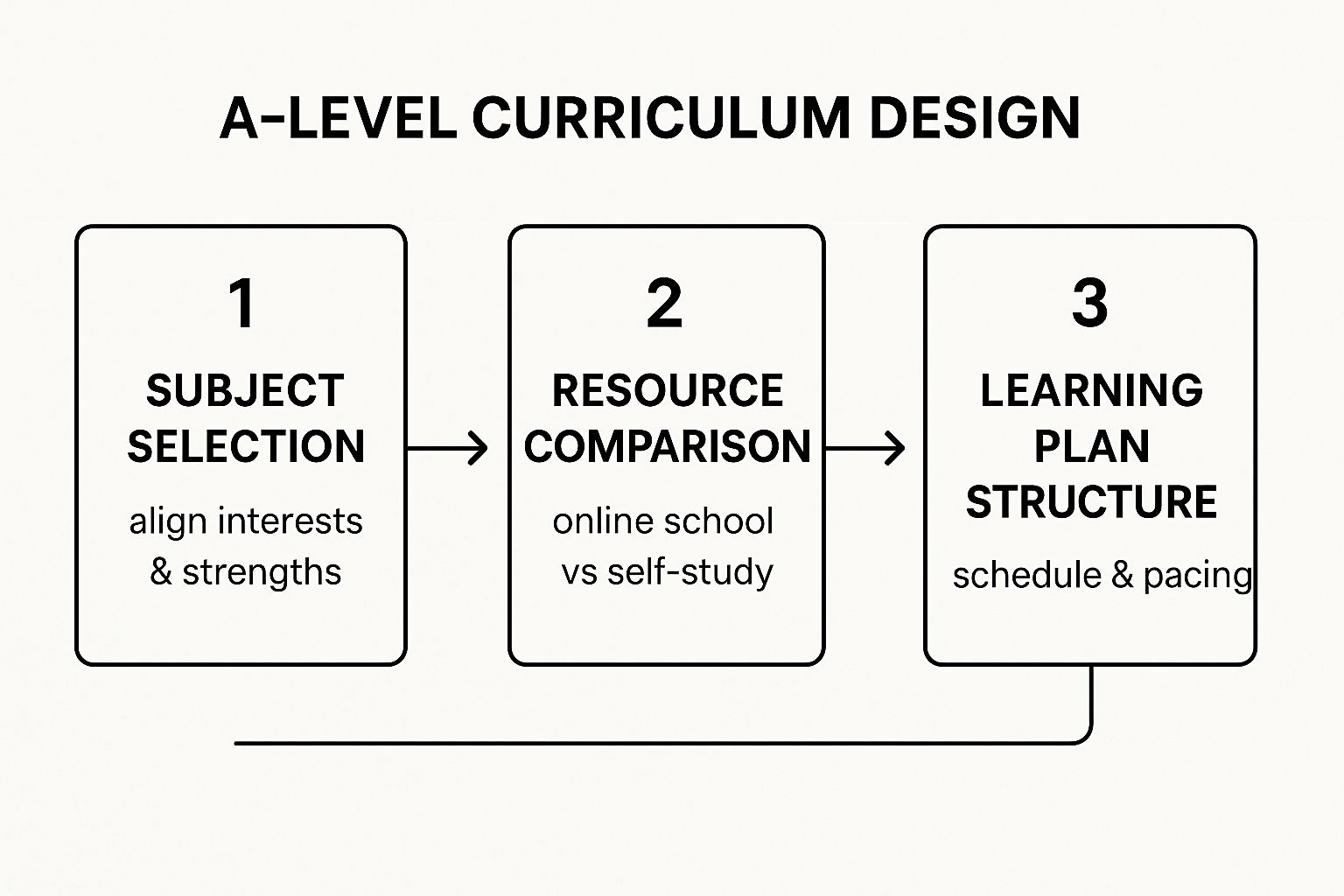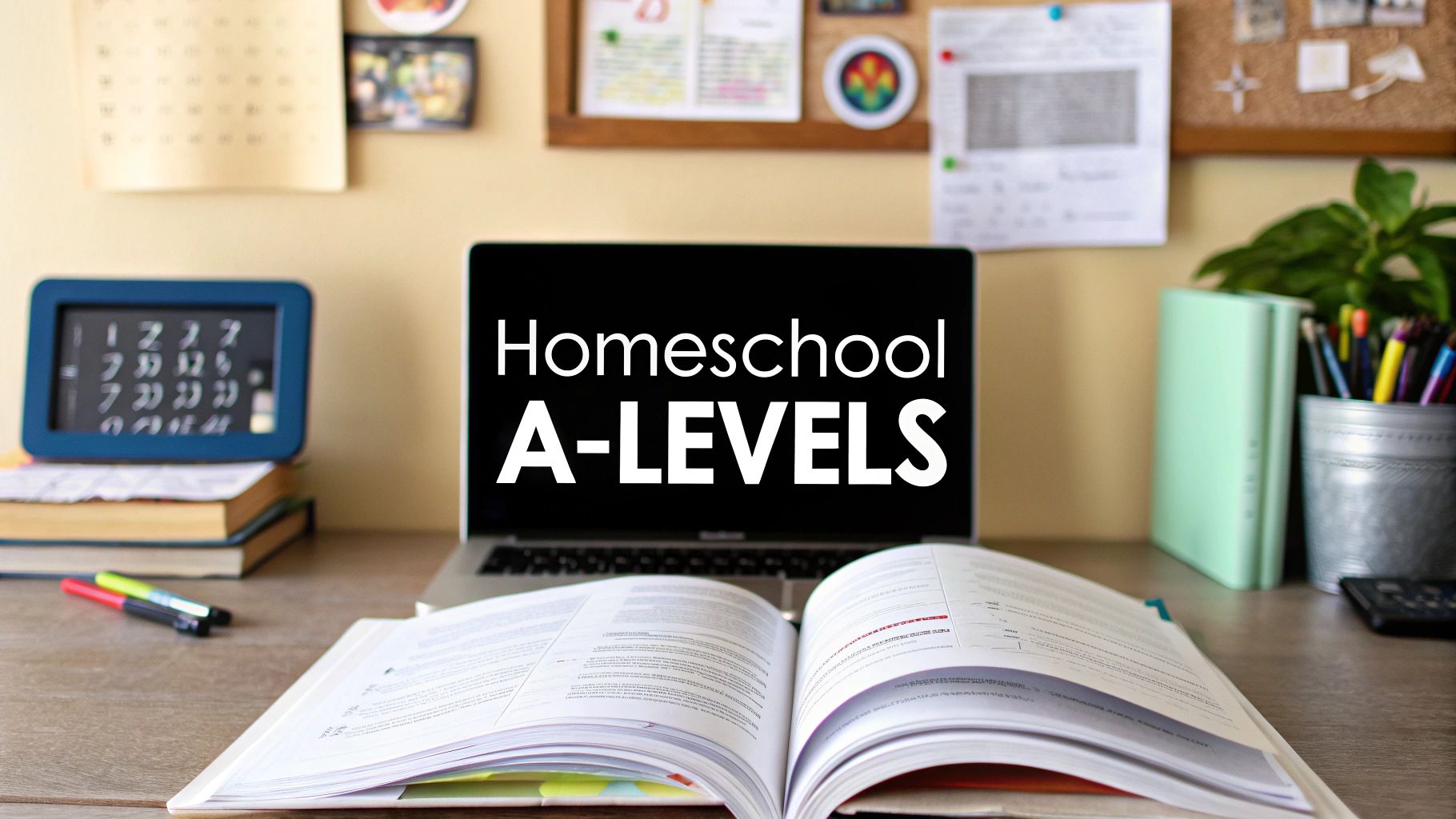Deciding to homeschool A-Levels is a huge emotional and practical step, but it’s one that opens up an incredible world of possibility for your child. It’s a choice to design an education that genuinely fits their unique personality, their dreams, and their natural pace of learning. It’s about bravely swapping a rigid, one-size-fits-all system for a flexible, supportive path that puts their well-being first, builds their confidence from the ground up, and prepares them for a future they’re actually excited to build.
Is This the Right Choice for Your Child?
Choosing to homeschool for A-Levels can feel like you're stepping off the well-trodden path, and that can be a little scary. For so many families, though, it marks the beginning of a truly rewarding and connecting educational journey. The UK has seen a huge rise in home education in recent years, with well over 100,000 children now learning at home. This isn't just a niche trend anymore; it’s a powerful signal that more and more parents are searching for an education that truly sees and nurtures their child as an individual.
This path isn’t just about aiming for top academic results. It’s a deep commitment to putting your child’s needs, their passions, and their mental health right at the heart of their education, every single day.

The flexibility you gain is unmatched. Imagine your child is a budding Computer Scientist who struggles with the noise and pace of a busy classroom. At home, they could spend a day or two each week volunteering at a local tech start-up, getting real, tangible experience that makes their A-Level theory click into place—something a traditional school timetable just can't accommodate. This isn't just learning; it's thriving.
Embracing a Personalised Education
A huge part of homeschooling A-Levels is the incredible gift of what is personalized learning and understanding how it can transform your child’s experience. It’s about tailoring the entire curriculum to their specific pace and interests, allowing them to dive so much deeper into the subjects they genuinely love, without pressure or comparison.
This tailored approach means your child can:
- Learn at Their Own Pace: If they find a concept in Maths tricky, they can spend a whole morning on it, guilt-free, until it makes sense. If they grasp a historical period in a single afternoon, they can move on without waiting for a class of 30 others. It’s about removing anxiety and building real mastery.
- Explore Their Passions: Imagine your child loves art. They can connect their A-Level History essays to the art of the period, making learning a rich, interconnected web of discovery rather than a series of disconnected subjects.
- Prioritise Well-being: A flexible schedule means less stress and more life. There's time for rest, hobbies, sports, and seeing friends. It honours the fact that a happy, rested teenager is a teenager who is ready to learn.
Addressing the Big Questions
Of course, your mind is probably racing with concerns. Questions about university applications, their social life, and the sheer academic rigour of A-Levels are completely normal and valid. Let me put your mind at ease: homeschooled students are often highly valued by universities precisely because they’ve developed fantastic independent study skills and a deep-seated self-motivation that sets them apart.
The real power of homeschooling A-Levels lies in its ability to honour your child as an individual. It's about nurturing their curiosity, building their confidence, and equipping them with skills that go far beyond the exam syllabus. It's an act of trust in them and their potential.
This guide is here to walk with you through every step, from choosing a curriculum that lights your child up to navigating the UCAS process with confidence. My goal is to give you the clarity and reassurance you need to decide if this exciting educational path is the right one for your family.
Designing Your Child's A-Level Curriculum
Right, this is where the real work—and the real joy—of homeschooling A-Levels begins. Once you've made the decision, you get the incredible opportunity to build a curriculum from the ground up, one that puts your child's unique spark, talents, and future dreams front and centre. This isn't about ticking boxes; it's a chance to craft a learning plan that feels alive and meaningful, perfectly suited to who they are becoming.
The whole process comes down to creating a path that’s both academically strong and emotionally rewarding for your child.
Choosing Subjects That Ignite Passion
First things first: picking the right subjects. This is so much more than just grabbing what’s needed for a university application. It’s a heartfelt conversation with your child about what truly fascinates them. What topics make their eyes light up? What are they drawn to when they have free time? What future are they just beginning to imagine for themselves?
Think of it this way. Your child dreams of becoming a video game designer. Their path becomes clear and exciting. They’ll naturally be drawn to Computer Science, Maths, and perhaps Art or Physics. These subjects aren’t just a random collection; they're the direct stepping stones to their dream course and connect to their passion for creativity and logic. Suddenly, their curriculum is more than just textbooks—it's the very foundation of the future they are building.
The infographic below breaks down the simple, logical steps to building a curriculum that really works for your child.

As you can see, a solid A-Level plan kicks off with these thoughtful, child-centred subject choices, moves on to carefully weighing up your resources, and finishes with a structured yet flexible study schedule that protects their well-being.
Selecting Your Homeschooling Approach
Once the subjects are locked in, the next big question is how you're going to teach them. There's no single "best" way to homeschool A-Levels. The right method is all about what fits your child's learning style, your family’s budget, and how hands-on you can realistically be. For a deeper look at the various models, exploring a comprehensive guide to the homeschool curriculum UK can offer some brilliant insights.
Generally, your choices boil down to two main camps: a structured online school or a more independent, self-study route. Each has its own emotional and practical benefits.
- Online Schools: This is a fantastic fit for a child who feels anxious without a clear structure or craves the connection of live classes. Providers like Wolsey Hall Oxford or our own Queen's Online School offer a complete, ready-made package with structured lessons, subject-specialist tutors, and a community of other students. It gives them support and you, peace of mind.
- Self-Study: This route is perfect for a highly independent, self-starting student who feels stifled by rigid timetables. You become the curator of their education, pulling together resources from textbooks, online tutorials, and past papers. It’s an empowering choice that puts them firmly in the driver's seat of their own learning.
The most effective approach is always one that respects your child’s independence while still providing the structure they need to feel secure. It’s a delicate balancing act between guidance and freedom, tailored just for them.
To help you weigh up the options, the table below compares the main approaches to homeschooling A-Levels, looking at what works best for different children and families.
Comparing A-Level Homeschooling Approaches
| Approach | Best For | Average Cost | Parental Involvement | Pros | Cons |
|---|---|---|---|---|---|
| Online School | Students who thrive with structure, expert teaching, and peer interaction. | £800 – £2,500+ per subject, per year | Low to Medium. The school handles the curriculum, teaching, and marking. | All-in-one solution, expert support, reduces parental workload, built-in community. | Higher cost, less flexibility in pacing and curriculum choices. |
| Self-Study | Highly independent and self-motivated learners; families on a tighter budget. | £100 – £400 per subject for resources. | High. Parent sources materials, oversees progress, and may need to mark work. | Maximum flexibility, highly cost-effective, completely customisable. | Requires significant parental time and organisation; student needs strong self-discipline. |
Choosing between these isn't just about money; it's about finding the best emotional and practical fit for your child's personality and your family's capacity.
Structuring a Sustainable Learning Plan
With subjects chosen and resources in hand, the final piece of the puzzle is creating a learning schedule that feels good and works long-term. The beauty of homeschooling is that you can ditch the rigid 9-to-3 school bell. You can build a routine that works with your child’s natural energy and rhythms, not against them.
For example, your creative child taking English Literature, Art, and History might share that their brain feels sharpest for analytical writing first thing in the morning, but their artistic inspiration really flows in the late afternoon. Their schedule can and should absolutely reflect that.
Here’s what a practical weekly block might look like for them:
- Mornings (9 AM – 12 PM): Deep focus time for the heavy lifting, like wrestling with a complex History essay or analysing dense poetry for English.
- Afternoons (1 PM – 4 PM): A mix of practical and research work. This could be hands-on studio time for Art, or a trip to a museum or gallery to get inspired and connect with the real-world context of their studies.
- Evenings/Weekends: Gentle time for wider reading, light revision, and personal projects, free from the pressure of formal lessons.
This kind of personalised timetable helps prevent burnout and fosters a genuine enjoyment of learning. It’s about creating a rhythm that feels both productive and balanced, giving your child the space to excel academically while also protecting their mental health. This is the very heart of a successful plan to homeschool A-Levels.
How to Handle Exams as a Private Candidate
The thought of organising A-Level exams can feel like the single most daunting part of the homeschooling journey. It’s where all your child's hard work finally meets the official system, and that can bring on a wave of anxiety for both of you. But take a deep breath. This is purely a logistical challenge—a puzzle with a clear solution, not an insurmountable barrier to their dreams.
With some forward planning, you can turn this process from a source of stress into a simple, manageable checklist that you can tackle together.

Finding a Welcoming Exam Centre
Your first job is to find a local school or college that accepts private candidates. It's important to know that not all centres do, so this will take a bit of patient detective work. The official Joint Council for Qualifications (JCQ) website has a directory to kickstart your search, but the real progress comes from picking up the phone or sending a polite email and connecting with a human being.
This is a growing need, as the UK's homeschooling community continues to expand. There were over 126,000 children learning at home during the 2022-23 academic year, a figure that shows there is a clear demand for private exam arrangements. You are not alone in this.
The single most important piece of advice is this: start early. Begin contacting potential exam centres up to a year before the exams are due to take place. This gives you breathing room, reduces the pressure, and ensures you can secure a place for your child without any last-minute panic.
The Practicalities of Booking Exams
Once you have a list of potential centres, it’s time to reach out. When you speak to the Exams Officer, you need to be clear, prepared, and confident.
Let’s imagine you're arranging your daughter's A-Level History exam. You find a local sixth-form college that takes private candidates and you schedule a call with the Exams Officer.
Here are the key questions you could ask to feel in control:
- Do you accept private candidates for our specific exam board and subject code (e.g., AQA History A)?
- What is the total fee per subject, including your centre's administration charge?
- What are your registration deadlines? (Heads up: these are often much earlier for private candidates).
- What paperwork will you need from us? This is usually just a copy of ID and the completed entry form.
- How would you handle the Non-Exam Assessment (NEA) component for History?
By asking these specific questions, you get all the info you need to make a confident decision and book your daughter's place. This proactive approach turns a potential headache into a straightforward, empowering task.
Navigating Subjects with Practicals and NEAs
This is a critical point that directly impacts your child's experience. Some A-Levels are far simpler to arrange as a private candidate than others. Subjects that are 100% exam-based, like Maths, are the most straightforward and least stressful to organise.
Things get more complicated with subjects that have practicals (like Biology, Chemistry, or Physics) or Non-Exam Assessments (NEAs). For science A-Levels, students must complete a 'practical endorsement'. Some distance learning providers offer intensive residential courses to cover this, but this adds significant cost and logistical planning, which can be stressful for a child who is already preparing for exams.
It’s also really wise to get familiar with how grades are awarded. Having a clear understanding of the marking system can help your child target their revision much more effectively. For a deeper dive, check out our detailed guide on A-Level grade boundaries.
Ultimately, successfully arranging exams when you homeschool A-Levels boils down to organisation and care. By starting early, communicating clearly with exam centres, and choosing subjects that align with a low-stress exam process, you can ensure your child has the calm and supportive run-up to their exams that they truly deserve.
Creating a Supportive Home Learning Environment
Homeschooling A-Levels successfully is about so much more than just ticking off curriculum boxes. It’s about creating a home environment that genuinely nurtures their curiosity, builds their independence, and fiercely protects your child’s well-being. This is where you step back from the textbooks and focus on supporting the whole person, not just the student.
Getting this right is a partnership. It involves listening to what your teenager needs and working together to build routines and spaces that help them feel safe, empowered, and in control of their own learning journey.

Fostering Independence and Self-Discipline
One of the greatest gifts of home education is giving your child the space to develop powerful self-discipline. This skill doesn't just appear overnight; it’s cultivated through trust, gentle structure, and the right tools. The goal isn’t to replicate a rigid school timetable but to find a rhythm that prevents burnout and encourages deep, focused work that feels good.
A fantastic place to start is by creating their dedicated study space together. Sit down with your teenager and ask them what they need to feel focused and calm. Is it a quiet corner away from family noise? A huge desk to spread out notes and books? Great lighting and a comfortable chair? When they have ownership over their environment, they feel respected and are far more invested in using it well.
From there, you can introduce simple time-management techniques. The Pomodoro Technique, for instance, is brilliant for making A-Level study feel less overwhelming. It breaks work into focused sprints (usually 25 minutes) followed by a short break.
Here’s how it might look for a Psychology student who gets easily distracted:
- 25 minutes: Intense focus on writing an essay on attachment theory. No phone, no distractions.
- 5 minutes: A complete break—stand up, stretch, get a drink, look out the window. Reset.
- Repeat x 4: After four cycles, they earn a longer break of 15-30 minutes to properly switch off.
This method makes intimidating study sessions feel manageable, building their mental stamina and keeping fatigue at bay.
Enriching Learning Beyond the Books
The real magic of homeschooling A-Levels is the freedom to bring subjects to life in a way no classroom ever could. This is your chance to transform abstract concepts into unforgettable experiences that spark a genuine, lasting love for learning.
Just think about the possibilities for your child:
- English Literature: A trip to Shakespeare’s Globe Theatre in London isn't just a day out; it’s feeling the energy of the words being performed in the very space for which they were written. It’s an emotional connection to the text.
- Biology: Participating in a local citizen science project, like a river health survey or a butterfly count, provides the kind of hands-on fieldwork that makes diagrams in a textbook suddenly click into place with meaning.
- Art History: Visiting a gallery to stand in front of a painting they are studying allows for a personal, emotional reaction to the brushstrokes and scale that a textbook image could never replicate.
A truly supportive learning environment is one that recognises education doesn't just happen at a desk. It's about grabbing every opportunity to connect what your child is studying to the vibrant, living world around them, in a way that feels exciting to them.
Part of this also means equipping your child with strong study skills. It’s well worth exploring modern approaches to research organization to help them manage their A-Level projects and feel confident and prepared for university-level work.
Nurturing Social Connections
Let's tackle the biggest myth about homeschooling head-on: the dreaded socialisation question. A supportive environment absolutely must include a rich and fulfilling social life. The trick is to be intentional about creating opportunities for your teen to connect with their peers in ways that feel natural and enjoyable to them.
Your flexible schedule is a massive advantage here. Without the exhaustion of a long school day, your child often has more emotional energy and time to invest in their passions and friendships.
Think proactively about building these connections:
- Find Teen-Focused Home Ed Groups: Most areas have vibrant networks that organise meet-ups, workshops, and social events specifically for homeschooled teenagers. It can be a huge relief for them to connect with others who just "get it".
- Join Local Clubs: Encourage your child to join groups based on their genuine interests—a local sports team, a coding club, a drama society, or a conservation volunteer group. This connects them with peers who share their passions, forming stronger bonds.
- Embrace Online Communities: For niche interests, moderated online forums and groups can be a lifeline. A student passionate about astrophysics, for example, can connect with fellow enthusiasts from all over the world, feeling seen and understood.
It’s all about separating 'school' from 'social life'. When you do this, you empower your child to build a diverse social circle based on genuine, shared interests—a vital and confidence-boosting life skill.
Applying to University After Homeschooling A-Levels
The journey from homeschooling A-Levels to stepping onto a university campus is a path well-trodden and filled with success stories. This final step in the homeschooling adventure can feel a little daunting, but it’s actually where your child gets to showcase the incredible strengths they’ve developed through their unique education.
Universities aren’t just looking for grades; they're looking for passionate, independent thinkers who can manage their own learning. Sound familiar? Your child embodies that description.
This process is all about translating their one-of-a-kind learning experience into the language that admissions tutors understand and value. It’s about helping them build a compelling narrative that highlights their resilience, their self-motivation, and a genuine love for their subjects.
Crafting a Standout Personal Statement
The UCAS personal statement is your child’s moment to shine. For a homeschooled student, this isn’t just a list of achievements; it's a powerful story of their intellectual curiosity and personal growth. It’s their chance to connect the dots between the A-Levels they chose and the person they want to become.
Think about the unique skills they've gained. They haven't just learned a syllabus; they've learned how to manage their time without school bells, how to dig deep into a topic out of pure fascination, and how to stay motivated on difficult days. These are the very qualities that define a successful undergraduate.
Encourage them to use specific, personal examples to bring their story to life:
- A Budding Historian: Instead of a generic "I am passionate about history," they could write, "My independent study of the Tudors went far beyond the textbook, leading me to spend weeks analysing primary sources at the local archives. Uncovering the surprising economic role of women in the period felt like a personal discovery, and I explored this in a 3,000-word essay that I initiated myself."
- An Aspiring Engineer: They might describe how the frustration and eventual triumph of teaching themselves Python to build a small sensor-driven robot helped them truly understand the principles they were learning in their Maths and Physics A-Levels.
This is how they demonstrate that their education was an active pursuit, not just something that happened to them. It’s all about showing their heart and their hard work.
Securing a Strong Academic Reference
One of the biggest worries for homeschooling families is the academic reference. Who can possibly write it? The key is to find someone who can speak credibly and warmly about your child’s academic abilities and work ethic from a professional standpoint.
Your best options are often:
- An Online Tutor: If your child has been working with a subject-specialist tutor, they are the ideal person. They’ve seen their progress, marked their work, and can comment directly on their academic potential with authority and personal insight.
- A Course Provider: For students enrolled in a structured online A-Level course, the provider can usually supply a detailed reference based on tutor feedback, assignment grades, and overall engagement.
- A Respected Professional: This could be a mentor from a work experience placement or a leader from a long-term volunteer project. They can attest to your child's maturity, skills, and dedication in a real-world setting, adding a powerful dimension to their application.
The reference needs to confirm their predicted grades, but more importantly, it should paint a picture of a capable, curious, and committed student who is more than ready for the rigours of higher education.
The university application is where the advantages of homeschooling A-Levels truly come to the fore. It showcases a student who hasn't just been taught, but one who has learned how to learn—a skill that will serve them for the rest of their lives.
Preparing for the Transition to University Life
While academic readiness is key, the emotional and social transition is just as important. For many homeschooled students, moving to university is their first experience of formal lectures and living away from home. Simply acknowledging this change with your child is the first step to navigating it successfully.
While detailed UK data on homeschooling A-Level outcomes can be scarce, the findings we do have are encouraging. General studies show that homeschooled students often display impressive academic growth, with some research indicating up to 24.5% show significant progress. Their academic preparedness is a strong foundation for success at degree level. To get a better feel for these trends, you can explore detailed homeschooling statistics and insights at thomaskeith.school.
The university system often relies on UCAS points to standardise applications, so it’s really helpful to understand how your child's predicted A-Level grades translate. For more clarity on this, our guide can help you fully define UCAS points and see how they are calculated.
Talk openly with your child about their hopes and fears. It can be useful to share tips from former homeschoolers who have made this transition:
- Embrace the Lecture Format: Reassure them that lectures are just a starting point. The real learning happens in seminars, tutorials, and independent study—areas where they already have a massive head start and will feel confident.
- Join Societies Early: Encourage them to sign up for clubs and societies during Freshers' Week. This is the fastest way to find their people and build a new social circle based on shared interests, not just proximity.
- Use University Support: Make sure they know it’s a sign of strength, not weakness, to use the support services available, from academic advisors to student well-being teams. These resources are there to help them thrive.
Homeschooling A-Levels doesn’t just prepare a child for exams; it prepares them for life. With a thoughtful application and a positive mindset, the move to university becomes the next exciting chapter in their educational adventure.
Common Questions About Homeschooling A-Levels
Even with the best plan in the world, the journey to homeschool A-Levels can throw up a lot of questions. It's completely normal to feel a mix of excitement and nerves. This section is here to give you straightforward, practical answers to the concerns we hear most often from parents, putting your child's needs and your family's peace of mind first.
Do UK Universities Accept Homeschooled Students?
Yes, absolutely. This is often the biggest worry, so let's put it to rest right now. UK universities are very familiar with and welcoming to home-educated applicants.
Ultimately, they care about two things: does your child have the required A-Level grades, and can they show a genuine passion for their chosen subject? The UCAS application process is exactly the same for everyone. The key is to help your child craft a personal statement that really showcases the unique strengths they have developed through homeschooling—like exceptional independent research skills and self-motivation. A strong academic reference, perhaps from an online tutor who has seen them grow, will complete the picture and present a candidate who is more than ready for university life.
How Much Does It Really Cost?
The financial side of things can vary dramatically, which is one of the great things about this path—you can genuinely tailor it to your budget and what feels right for your family.
- Self-Study Route: This is the most affordable option. For a child who loves to learn independently, you might only need to cover exam fees (£150 to £300 per subject) plus textbooks and online resources.
- Structured Courses: If your child needs more support in a particular subject, enrolling them in a specific A-Level course can be a great middle ground, costing several hundred pounds per subject.
- Online Schools: A full-service online school with live lessons and dedicated tutors offers the most support for your child and takes the organisational load off you. This can run into several thousand pounds a year, but for many families, the peace of mind is worth it.
Always remember to budget for exam fees separately. They are a significant and non-negotiable cost that sits outside of any curriculum or tuition provider fees.
What About Subjects With Practicals Or Coursework?
This is a crucial logistical hurdle that needs early and careful planning to avoid stress for your child. For science A-Levels like Biology, Chemistry, and Physics, students must achieve a 'practical endorsement'. Some distance learning providers offer intensive, residential lab courses to get this done, but this adds a considerable expense and requires travel, which can be an anxious time.
Subjects with Non-Exam Assessment (NEA) components, like the coursework in History or English Literature, can be more manageable. However, you must find an exam centre willing to accept and authenticate the work of a private candidate. Because of these complexities, many families who homeschool A-Levels find it simpler and kinder to their child to choose subjects that are assessed 100% by examination.
For example, a combination like A-Level Maths, Economics, and Politics completely sidesteps the practical and NEA hurdles, allowing your child to focus purely on their learning and revision, which can make the whole exam period feel much calmer.
How Can I Ensure My Child Has A Social Life?
This is a concern that comes from a place of deep care for your child's happiness, but it's a fear you can confidently put aside with a bit of proactive effort. The key is to separate 'schooling' from 'socialising'.
Your child's social life doesn't need to happen within their 'school' hours. In fact, the flexibility of home education often gives them more time and emotional energy to pursue their real interests and build meaningful friendships on their own terms.
- Join local clubs: Whether it’s a sports team, a coding club, a drama group, or a conservation volunteer team, encourage them to join groups based on what they genuinely love. This is where they'll find their tribe.
- Find home ed networks: Look for local home education groups that organise regular meet-ups and social events for teenagers. These communities can be a wonderful source of support and friendship for a child who needs to know they aren't the only one on this path.
By being intentional, you can help your child build a rich, diverse, and fulfilling social life based on genuine shared interests—a brilliant skill for a happy life.
At Queen's Online School, we provide the structured support and expert teaching your child needs to excel in their A-Levels, all within a vibrant and supportive global community. Discover how our accredited online school can make your homeschooling journey a resounding success. Learn more at https://queensonlineschool.com.

